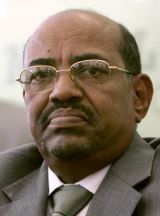Sudanese president repeats rejection of UN peacekeepers
March 28, 2007 (RIYADH) — Sudanese President Omar al-Bashir on Wednesday underlined his rejection of U.N. peacekeepers in the war-torn Darfur region, saying the U.N. should only provide financial and technical help to African peacekeepers.
 Al-Bashir made the comments in an opening speech to an Arab summit in the Saudi capital, attended by U.N. Secretary-General Ban Ki-moon, who is hoping to meet the Sudanese president in an attempt to convince him to accept peacekeepers.
Al-Bashir made the comments in an opening speech to an Arab summit in the Saudi capital, attended by U.N. Secretary-General Ban Ki-moon, who is hoping to meet the Sudanese president in an attempt to convince him to accept peacekeepers.
But in a sign of cooperation, Sudan and the U.N. signed in Khartoum a new agreement designed to ease humanitarian groups’ access to refugees in Darfur, where violence and government restrictions have impeded aid groups from providing food and other help to the victims.
However, al-Bashir said U.N. resolutions calling for a U.N. troop deployment in Darfur were “a violation for Sudan’s sovereignty” and “provoke the conflict in Darfur, instead of finding a solution for it.”
“We assure you that we do not desire a confrontation with the international community, but what we are seeking is to keep the African color of the forces in Darfur according to the shape and leadership, but on condition that the UN will take over the financial, technical and logistic support for those forces,” he said.
Al-Bashir said the U.N. should step up efforts to negotiate a political settlement in Darfur.
Some 70,000 African Union peacekeepers have been unable to put an end to escalating violence in Darfur, where government forces and ethnic African rebels have been battling for nearly four years. Al-Bashir’s government is accused of backing Arab janjaweed militiamen blamed for widespread atrocities against ethnic African civilians. More than 200,000 people have been killed and more than 2.5 million driven from their homes.
International officials have struggled for months to overcome Khartoum’s rejection of the U.N. force. Ban is looking to meet with al-Bashir on the sidelines of the summit, perhaps along with Saudi King Abdullah, whose help Ban is seeking to convince the Sudanese president to compromise.
Last week, Ban failed to convince Egyptian President Hosni Mubarak to pressure al-Bashir. “Talking about exercising pressure will not lead to a solution to the problem,” Egyptian Foreign Minister Ahmed Aboul Gheit said.
Both the U.N. and private aid groups have warned that unless aid groups are given better access and more protection in Darfur, the humanitarian situation there could worsen considerably.
Sudan and the U.N. announced the humanitarian aid agreement as the U.N.’s new humanitarian chief, John Holmes, was touring Darfur refugee camps in neighboring Chad.
Under the agreement, the government of Sudan agreed “to extend all necessary and possible facilitation” to humanitarian groups trying to operate in Darfur.
Holmes himself was denied access last week to a refugee camp in Darfur by forces of Sudan’s army, but Sudan’s government later apologized and allowed him to tour camps.
“I am cautiously pleased that this agreement has been signed and publicized,” Holmes told The Associated Press in Abeche. “I hope it will make a difference to humanitarians on the ground, and therefore make life better for those they’re trying to help.”
The agreement was signed earlier Wednesday in Khartoum, at the ministry of foreign affairs, by Ali Karti, acting minister for foreign affairs, and Manuel Aranda da Silva, deputy special representative of the U.N. secretary general.
Holmes, who negotiated the agreement, said the “important thing is whether they will actually implement what they say. Of course we will be following this carefully.”
Under the agreement, a “high-level monitoring committee” jointly chaired by the Sudanese minister of humanitarian affairs and the U.N. humanitarian coordinator in Sudan, will fastrack visa procedures and work permits for Darfur-bound aid workers.
It also assures international aid workers living in Sudan free travel throughout the country — including Darfur where travel has been restricted — upon notifying Khartoum of travel plans. The government for its part guarantees to speed up release from customs of all humanitarian equipment.
(AP)
